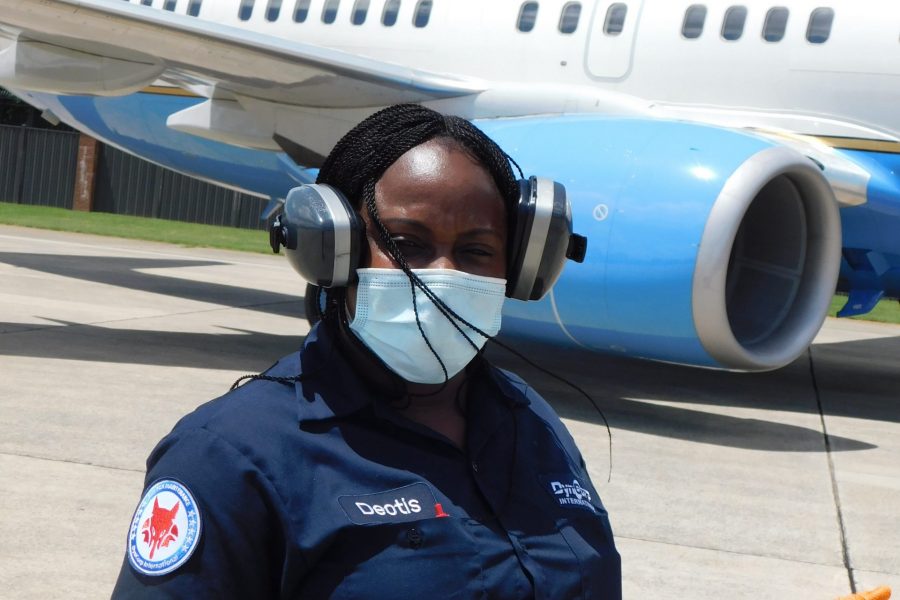At Joint Base Andrews (JBA) in Maryland, the Air Force’s Executive Airlift fleet of the 89th Airlift Wing (AW) provides airlift support worldwide for our nation’s leaders, including the vice president, Cabinet officials, members of Congress, and senior civilian, military, and foreign leaders. And how does a 24/7, no fail, high expectation mission thrive under the burden of COVID-19? Answer: with a little help from its service provider of 19 years.
DynCorp International (DI), a 70-plus year aviation and logistics services provider, performs fixed-wing aircraft maintenance and back shop support to the Executive Airlift fleet. DI ensures the safe and timely transportation of 89 AW customers worldwide, and the 89 AW relies on these services to provide world-class airlift.

In March, coronavirus exposure reduction plans were formulated. DI’s Executive Airlift and 89 AW teams collaborated to establish these plans and protect the maintainers, operators, and passengers while simultaneously managing the flying mission.
“When the coronavirus was first declared a pandemic, we experienced a temporary decrease in flights, which allowed the team to negate any flight discrepancies or delays while working with equipment manufacturers and the Air Force to develop a plan for protecting both the customer and workforce,” said David Christner, DI Executive Airlift director of maintenance.
“Not only do we maintain the aircraft, we also manage the stocks and supplies,” added Christner. “Many standard disinfectant products cannot be used on our aircraft and our current suppliers were experiencing shortages, so before our supplies were depleted, we had to research product ingredients to find alternatives that were both available and effective.”
In partnership with 89 AW, the Executive Airlift team developed COVID kits for each aircraft—mainly disinfectants, masks, gloves, and plastic suits—to be used if the crew was faced with a COVID situation off-station, all while keeping passengers isolated and areas sanitized between flights.
Initially, the base was unable to procure masks, so DI made 1,500 of them for JBA, thanks to the efforts of the Survival Equipment team, Maintenance Branch members and Back Shop Support personnel.

“They did a great job,” said Dennis Clothier, Executive Airlift operations manager. “We’ve issued four masks per person so everyone will have several masks to alternate. Assigned personnel are required to wear a face covering unless it interferes with better PPE or presents a safety hazard.”
“It is everybody’s responsibility to enforce and challenge people who do not wear their face covering while at work,” continued Clothier. “We are fostering protective behaviors, like the masks and other protection requirements, so they will become ingrained safety habits.”
To protect the workforce by reducing exposure opportunities, the program split their flight line and back shop maintainer workforce into A and B shifts, with the last 30 minutes of each shift being devoted to extra disinfectant procedures in shared areas. Employees follow a frequent and thorough hand-washing regiment upon arrival, departure, and during the shift. Hand sanitizer units were installed throughout the maintenance complex. There is no physical contact between shifts; turnover reporting is done via telephone or notes. A sign-in system was created to manage COVID specific contact tracing. Anyone entering an aircraft—maintainers, aircrews, and passengers—annotate their date and time of entry into an aircraft log.
“I provide two separate daily COVID-19 reports to the Wing and DI leadership,” said Ops manager Clothier. “All 89 AW units are required to submit daily SITREPs on COVID-19 impacts to operations, training, or mission effectiveness. We also submit a Daily Corona Report to our corporate headquarters.”
“We have a 14-day quarantine requirement for potential exposure and sign-in logs at the base for contact tracing,” added Clothier. “While splitting the workforce into an A and B shift reduced the amount of personnel available at any given time, it certainly has been effective at reducing exposure. So far, out of 300 assigned personnel we’ve only had one that tested positive for COVID-19 while off-duty, and we took quick action to ensure there was no opportunity to transmit the virus to a colleague.”

“DynCorp International has a stay-at-home policy we’ve used several times,” said Craig A. O’Neal, Executive Airlift program manager. “The policy requires employees to immediately inform HR or their immediate supervisor and not report to work if they have any symptoms, have tested positive, or been in close contact with someone who has tested positive.”
“The Environmental, Health, and Safety (EHS) manager has been on top of response procedure development and COVID-19 publications,” continued O’Neal. To protect the flight line and passengers, a pre- and post-flight sanitation process was collectively developed for all aircraft missions along with a “hot” arrival procedure at JBA, meaning an aircraft with a symptomatic, or positive-tested, or confirmed contact with a symptomatic or positive-tested COVID-19 occupant on board. If it’s “hot,” the aircraft is parked and DI personnel line up the required number of ionizer machines outside the aircraft for one crew member to carry on board and activate. The aircraft is then ventilated for a minimum of 72 hours before a DI team member enters to manually sanitize the aircraft.
Clothier commented, “We are extremely proud of the fact that we have been able to successfully manage this situation, protect our workforce, and customers with little or no impact on the mission.”
“The operations tempo will absolutely increase for election season,” said Clothier. “The protection procedures we have implemented these past several months have ingrained a safety culture of compliance here that will drive our success moving forward.”
